John Janaro's Blog, page 194
February 16, 2018
The Horror in Parkland Florida
 Marjory Stoneman Douglas High School, Parkland Florida. Wednesday, February 14, 2018.
Marjory Stoneman Douglas High School, Parkland Florida. Wednesday, February 14, 2018.Rapid-fire shots blistering through the halls and classrooms from an AR-15 semiautomatic rifle wielded by angry young hands.
Seventeen students and teachers killed. Numerous others wounded. An entire community reeling from the trauma.
Ugh, the horror. The horror of it! Words can't make it go away. Black ribbons, condolences, sorrow, none of it begins to fathom the depths of the ugliness, the evil, the laceration of humanity.
And the tears of parents, brothers, sisters, family, friends: yet another river of tears that runs into a vast ocean of all the tears that have already been shed.
These are evil times we live in. This is a death culture, with its illusions and excess and waste and loneliness, with "freedom" understood as the proliferation of meaningless choices.
By all means, let's make better laws.
Let's remember too that the particularly ugly violence of our times is not new. It's just getting harder to ignore. It's coming out of hiding. It's showing itself in more brazen forms.
 It's showing itself in our own hearts. I see it in my heart: I hurt people, mock them, scoff at them, look down upon them. I do this above all to the people who are closest to me.
It's showing itself in our own hearts. I see it in my heart: I hurt people, mock them, scoff at them, look down upon them. I do this above all to the people who are closest to me.The horror casts its shadow within me, and its poison is always within reach. Violence is not just a problem in society. It's a problem in me.
And I can't resolve it. I don't have the answer, and I don't know how to extricate myself from complicity in the war that we all wage against one another.
"Non-violence." Is that just another impossible idea? Is that just more useless talk?
But I am convinced that the non-violence of love is greater than the violence of our hearts, of my own heart—not because I grasp this as a theoretical scheme or a social ideology or an imaginative utopian aspiration.
I am convinced because I have encountered love. I have met love in the flesh, and now my heart pleads for the freedom to follow that love, to see the face of that love every day.
Sometimes it's very hard to remember that beautiful face; it seems shrouded in darkness and there is the danger that we will begin to think that we just dreamed the whole thing up.
We must resist this sad sleep. Let's help one another to stay awake and remember.
It is only when I remember the face of love that I myself begin to have the courage to take the risks of love that bridge the abyss of death.
Published on February 16, 2018 20:47
February 13, 2018
Open Our Ears and Our Hearts

Here is something of a reflection, a poem, a prayer, a plea from my own misery to the omnipotence, goodness, and mercy of God in Jesus Christ.
This text was published last week in MAGNIFICAT. It seemed to resonate with others, so I am reproducing it here as we enter upon this holy season of prayer, penance, and preparation for the celebration of the victory of Christ's all-embracing love.

Published on February 13, 2018 20:58
February 10, 2018
The Person She Became
Published on February 10, 2018 20:48
February 8, 2018
Josephine Bakhita Shows Us How to be Free
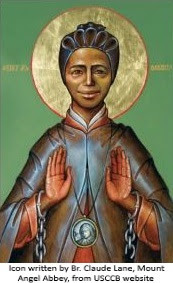 Today we honor an African woman born in 1869 who endured years of slavery under brutal inhuman conditions before being freed, and discovering an even greater freedom in following Jesus.
Today we honor an African woman born in 1869 who endured years of slavery under brutal inhuman conditions before being freed, and discovering an even greater freedom in following Jesus.She was called "Bakhita" by the Arab slave traders. It means "lucky one."
There was nothing that looked lucky about the horrible abuse and mutilation that she suffered as a slave in Sudan. But then she was brought to Italy, where she worked in the household of an Italian diplomat and merchant and helped care for his daughter.
Accompanying the girl to her convent school, Bakhita encountered the love of Christ among the Canossian sisters, gave her life to him, and was baptized Giuseppina Fortunata ("lucky one" in Latin).
Though the diplomat's family treated her well, her position in Italy had not been legally clarified. An Italian court recognized her freedom, however, when she decided that she herself wanted to join the Canossian sisters.
As a consecrated religious sister she worked for 50 years at the convent and among the people, simply but with profound charity and great joy. She not only forgave her enslavers and oppressors, but said she would kiss their hands if she saw them, because through their hands the Lord had brought her to Jesus.
She died on February 8, 1947 and was canonized in the year 2000.
Saint Josephine Bakhita, you have a lot to pray for. We need your prayers especially in today's world.
Pray for an end to racism, human trafficking, child abuse, and violence against women.
Pray for South Sudan, your homeland. Pray for Africa and people everywhere of African heritage, especially those subjected to racial prejudice.
Pray for people all over the world who have been driven from their homes by war, persecution, or inhuman living conditions.
Pray for us, that we might love our enemies and and not seek vengeance against those who hurt us. Pray for us to be strengthened in the conviction that God loves us and them, that God has a plan, and that God orders everything to the good.
Published on February 08, 2018 14:08
February 6, 2018
Twenty Six From Nagasaki
"My religion teaches me to pardon my enemies and all who have offended me. I do gladly pardon the Emperor and all who have sought my death. I beg them to seek baptism and be Christians themselves" (Saint Paul Miki, as he was crucified along with 25 others in Nagasaki, Japan, February 5, 1597).
 [Photo above, at Martyrs' Memorial, Nagasaki.]
[Photo above, at Martyrs' Memorial, Nagasaki.]
Today we honor the TWENTY SIX MARTYRS OF NAGASAKI, JAPAN. My current research has led me to this same place in the 20th century, to a remarkable Japanese doctor Takashi Nagai, who found Christ thanks to the witness of the spiritual children of these martyrs.
(Sorry, no spoilers from me on Takashi Nagai's amazing story, of which I am writing only the first part. You'll have to wait for the article.)
 [Photo above, at Martyrs' Memorial, Nagasaki.]
[Photo above, at Martyrs' Memorial, Nagasaki.]Today we honor the TWENTY SIX MARTYRS OF NAGASAKI, JAPAN. My current research has led me to this same place in the 20th century, to a remarkable Japanese doctor Takashi Nagai, who found Christ thanks to the witness of the spiritual children of these martyrs.
(Sorry, no spoilers from me on Takashi Nagai's amazing story, of which I am writing only the first part. You'll have to wait for the article.)
Published on February 06, 2018 17:03
February 4, 2018
The Miracle is that "Something is Different" in Our Lives
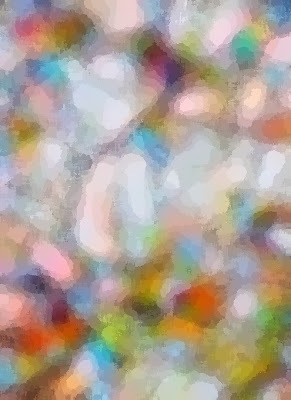 If we are committed Christians, we know that the love of Jesus is everything. This love has touched our lives, and we know that its power is nothing short of miraculous.
If we are committed Christians, we know that the love of Jesus is everything. This love has touched our lives, and we know that its power is nothing short of miraculous.We know that it is wonderful. It is transforming. We know that he wants to share this love with every human person.
And we are his witnesses.
Surely, we want to be on fire with this love so that it can shine through. We want the change in our lives to show that miracles are possible.
Right? "...Uh...yeah, sure.... I mean, yes, of course. Of course! Hallelujah!"
Hmm...so how's that "witness" going?
Maybe not so well, if we're honest about it. If we have known the love of God himself in the embrace of Christ, why do we keep forgetting and going back to selfishness, egoism, distraction, and strife?
Every day we fail. Even those who aim the highest find that they fall short again and again. Should this be a cause for discouragement?
Certainly not.
It should be cause for humility, for prayer, for turning and returning to the sources of grace, the places where Jesus "touches" us. Our faith makes especially clear the fragility of our humanity, our immense poverty, our utter dependence of God for everything.
Still, we know that God is good and merciful, and that he has embraced our lives. We must not give up, but on the contrary cling ever more fully to him.
Knowing the depths of God's love and our own weakness, we have all the more reason to look upon the struggles of every human person with compassion. Knowing God's generosity and our own vulnerability, we have every reason to forgive others when they hurt us.
We cannot be complacent. We must always strive to say "yes" to the love God pours out on our lives, to beg for his love to change us, to turn us into lovers, to show the wonder of his beauty through us.
The "miracle" that people can discover when they look at our witness is not that we're "totally perfect" human beings. We're not even remotely close, and we don't need to hide that fact or pretend that's what we claim to be.
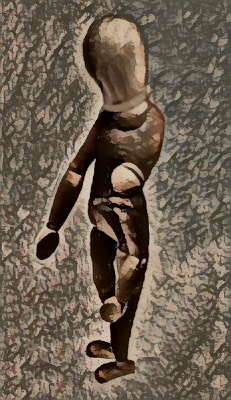 The miracle is not that everything is different in our lives, or that we have become totally coherent—that we have become overnight "instant saints."
The miracle is not that everything is different in our lives, or that we have become totally coherent—that we have become overnight "instant saints."Rather, if we are faithful, what people will begin to see is that in the midst of all our real messy flawed human lives, something is different— there is Something Else that gives us hope, "Something"(SomeONE) for whom we live....
Or at least they might see that we try to live for the One who loves us, that we desire it, we yearn for it and beg for it... because he is drawing us to himself.
I look at myself and it's clear that I'm so obviously mediocre, vain, and lazy that if there is any spark of that difference—that newness of life—in me (or even the desire for it) there must be Another at work in me.
I pray to be open to his work, to stay with him, to walk with him, and then in all the craziness of my life something new begins to happen. If as Christians we share the journey of our lives honestly and humbly, the light of the miraculous love that is changing us will shine and awaken hope in the hearts of others.
Published on February 04, 2018 20:00
February 2, 2018
Presentation 2018
 Details from Mosaic of the Presentation in the Temple, Marko Rupnik.
Details from Mosaic of the Presentation in the Temple, Marko Rupnik."Simeon blessed them and said to Mary his mother,'Behold, this child is destined
for the fall and rise of many in Israel,
and to be a sign that will be contradicted
—and you yourself a sword will pierce—
so that the thoughts of many hearts may be revealed'"
(Luke 2:34-35).
Published on February 02, 2018 20:00
February 1, 2018
The Grammy Awards: It Wasn't ALL Bad
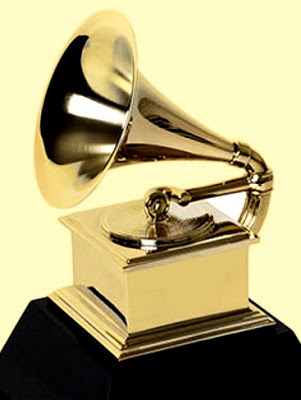 You know the old saying about a broken clock? It's still right twice a day.
You know the old saying about a broken clock? It's still right twice a day.Looking at the news, you might conclude that the recent 60th Grammy Awards was a real dumpster fire. I can't say that it wasn't, but the level of conflict doesn't surprise me. The whole music "industry" in its current form is unsustainable.
There are so many issues here that one doesn't know where to begin a diagnosis of the overall problem.
I didn't watch the awards show. One reason is because—like so many "old media" events—it has a bit of the feeling of a 1907 convention of horse-carriage makers giving out awards to one another and ignoring that vulgar and preposterous novelty of the "auto-mobile."
Recording technology has certainly advanced in some astonishing ways, but new multimedia platforms are increasingly catching up and making these developments (and entirely new techniques) accessible to a vast range of creative people, most of whom are "outside" the current system and are not even aware of how they're changing it.
These independent artists might feel a bit snubbed, not invited to the party, etc. People making music on regular labels within the system feel snubbed. Meanwhile, the Recording Academy is stretched way beyond any reasonable limit.
It wouldn't be so bad if the Grammy Awards show was not presented as the Contest For Ultimate Awesomeness, the "Uber-Olympics of Music." Unfortunately, such hyperbole is built in to the current music business model. This garish overreach is part of what's killing the whole thing.
Nevertheless, for an artist to be nominated for a Grammy certainly means something. And winning is a thing to be proud of. It's a recognition of achievement by the USA's realm of professional recorded music. It encourages artists and gives them a platform for their work to become better known.
I don't ignore the Grammys, but I prefer to wait until they're all over and done and then comb through the long list of winners and nominees to see if there was some outstanding work last year that I missed. It takes a little time, but it's a pretty good list.
Even though the Grammys are not attuned to so much of the larger world of outstanding artists who are working independently, and even though the actual process of determining the winner is somewhat inscrutable, the nominations are vetted by a large pool of recording professionals. There are also a lot of categories, the vast majority of which don't appear on the big Prime Time show.
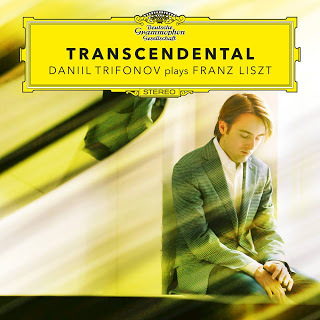 Daniil Trifonov won Best Instrumental Solo for this great record.Maybe that's too bad. It wouldn't hurt the pop stars and the glitterati (or the rest of us) to sit down for a few minutes and listen to somebody like 26 year old Russian pianist Daniil Trifanov play a bit of Liszt and Chopin. You don't have to be a music snob, or locked on to the lower frequencies of FM radio, to appreciate this guy. He'd blow. everybody's. minds! He is insanely good, and that may be one of the least controversial things I've ever said about music.
Daniil Trifonov won Best Instrumental Solo for this great record.Maybe that's too bad. It wouldn't hurt the pop stars and the glitterati (or the rest of us) to sit down for a few minutes and listen to somebody like 26 year old Russian pianist Daniil Trifanov play a bit of Liszt and Chopin. You don't have to be a music snob, or locked on to the lower frequencies of FM radio, to appreciate this guy. He'd blow. everybody's. minds! He is insanely good, and that may be one of the least controversial things I've ever said about music.Or let's hear four-time Grammy winner and Queen of the Violin, Anne-Sophie Mutter, bring a flow of vivid tones from her 1701 Stradivarius (no amplification required). Or America's own Grammy winning Hilary Hahn who is boldly bringing classical violin into the 21st century.
Classical music is alive and well, peeps. In some sense, it's never been better. In fact, it's overwhelming (like everything else in our world today). The Grammy winners and nominees don't necessarily correspond to the best performances evah but it is a pretty good list of top quality recent material. If, like me, you are looking for some excellent recordings not just for your iTunes playlists but for actually buying in CD form and listening to on a decent music system (or at least with real headphones), the Grammy list is useful. These CDs are expensive, but there's a reason for that.
I've been listening to "records" for over fifty years (I remember "air-conducting" Toscanini's Beethoven with my Dad at age four). The advances in recording technology are just stunning. I see this especially in the category of "Orchestral Performance"—while they still can't capture all the range and nuance (and excitement) of seeing and hearing a live orchestra, recordings have become exquisite works of art in their own right, and they should be appreciated as such.
 THIS! Good call, Grammys!When recording excellence and musical genius come together, the result is pure gold. The Grammy for Best Orchestral Performance in 2017 did not fail to find the gold. I'm excited because this recording is a discovery for me of the past week.
THIS! Good call, Grammys!When recording excellence and musical genius come together, the result is pure gold. The Grammy for Best Orchestral Performance in 2017 did not fail to find the gold. I'm excited because this recording is a discovery for me of the past week.I am so loving this magnificent and intense interpretation of Shostakovich's Fifth Symphony by Manfred Honeck and the Pittsburgh Symphony Orchestra.
Granted, I am a fan of this complex, sometimes tormented but brilliant 20th century Russian composer. When he wrote this symphony, Dmitri Shostakovich was trying to stay alive in Stalin's Soviet Union in 1937. As we know, lots of folks were having trouble staying alive at that time, particularly anyone with cultural status.
While he was willing to fake devotion to the Great Man, Shostakovich would not compromise his music. The result was an epic sonic poem that travels through the deep places of Russia's suffering, and touches the souls of the people while deftly mocking the totalitarian state that enslaved them. Music was the only language that could still speak in those days, and even music had to be careful. Stalin, however, was sufficiently tone-deaf that he did not have the composer shot in 1937. Shostakovich would continue to write an extensive repertoire of such works thoughout the Stalinist era and beyond.
Maestro Honeck is noted for bringing out the hidden gems of orchestral pieces, and after ten years with the world-renowned Pittsburgh Symphony he and the musicians have a great rapport. And just from the streaming of this recording I can tell that it's top notch. I'm waiting for my CD to arrive, with Honeck's extensive liner notes on Shostakovich and on Samuel Barber's beautiful Adagio that completes the record.
 Manfred Honeck, Music Director of the Pittsburgh Symphony Orchestra
Manfred Honeck, Music Director of the Pittsburgh Symphony OrchestraBut here's the thing: I didn't even know about this record until this week. I have the Grammy Awards to thank for pointing it out to me. So, <cough cough> "Thank you, Grammys!"
I still have to browse some other categories: Jazz, Roots Music, even "Rock Instrumental" (you'd be surprised at the good stuff you never hear about).
The "Big Four," which get all the media attention, have often disappointed me. This year, however, they got one of them right on target. Or, to put it another way, I was very happy to hear that Alessia Cara won the Grammy for Best New Artist.
"Best New Artist." There is something ironic about the whole category. It is, of course, really "Best New Popular Music Artist" which is fine, I suppose, because everybody already knows that. And the varieties of popular music have an excellence of their own.
Here a singer is distinguished by his or her unique style. It's not easy to put this up for a vote to music professionals. The key to the artistry is mastering one's particular voice, bringing various elements together and shaping them into a musically expressive "instrument" of a very fragile type of beauty.
It's a kind of self-exposure, a risky endeavor—thus, not surprisingly, often taken up by adolescents in the boldness of their youth. It's a tremendous thing, to discover and refine a unique talent. But in the past, very young people have often been unprepared for what a combination of success and luck brought about as they suddenly became celebrities.
Now the teens are the pioneers of new media technology. They are finding the creative spaces that open up new paths of putting out music and new (sometimes more manageable) levels of success. These new media also create new problems, but that's a topic for another day. What I want to do here, besides indicate once again the significance of YouTube, is point out how it has served Alessia Cara's development as an artist.
People were saying that Alessia shouldn't have qualified as a "new artist" because her music first hit the charts in 2015. She was well within the limits of the Grammy qualifications for this category, however, so this is all petty quibbling.
The fact is, this kid from Brampton, Ontario started a YouTube channel in 2010 and began posting covers and accompanying herself on guitar. (Brampton is basically part of "the metro Toronto area," but one of the things I like about Alessia is that she specifies it as Brampton. She comes from a real place, and has a sense of connection to it; as far as I know she still lives there.)
She was a 14 year old girl who loved singing, but was actually afraid to sing in front of other people. So she started out in her closet with a camera, hoping that posting videos would ease her into the prospect of singing in front of people. Her original channel is still active, and those first videos are still there. She was good. She had a sound and lots of heart and she worked on it and improved for several years.
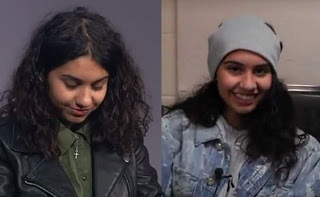 Shy? A little bit. Afraid? Not any more.Unlike others I have written about, Alessia didn't start by becoming a "YouTube star." She developed a small following at her own pace, and eventually got the attention of a talent developer, started writing songs and doing studio recording while finishing high school and living a regular life, having friends, going to parties, going to dumb parties and not having fun at dumb parties....
Shy? A little bit. Afraid? Not any more.Unlike others I have written about, Alessia didn't start by becoming a "YouTube star." She developed a small following at her own pace, and eventually got the attention of a talent developer, started writing songs and doing studio recording while finishing high school and living a regular life, having friends, going to parties, going to dumb parties and not having fun at dumb parties....Apparently, kids all over North America and the world were not having fun at stupid parties. (Maybe this is a sign of hope?) But they weren't telling the rest of us. They were, it seems, waiting for someone to write a song about it. Alessia Cara's song "Here" was all over the place in 2015, as was the clever and stylized music video. My brother and I are both music nerds and between the two of us we have heard everything, but we both thought "this is...interesting, and...different, and, gosh...refreshing, real...and really good."
So she had a Billboard Top 40 hit, but it wasn't instant fame. In 2016 she had a very fine and successful debut album and several more hit songs. She won the Juno Award (i.e. the "Canadian version"
Published on February 01, 2018 19:30
January 31, 2018
Draw Our Hearts Closer to You

"For know, dear ones, that every one of us is undoubtedly responsible for all people, and everything on earth...each one personally for all humankind and every individual human being" (Father Zossima in Dostoevsky, The Brothers Karamazov, chapter 25).
I have always been struck by these words that Dostoevsky puts on the lips of his famous fictional staretz. They may have been inspired by monks the author visited during a pilgrimage to several great Russian monasteries prior to writing his last and greatest novel, just as the character of Alyosha, Father Zossima's young disciple, was inspired in part by Dostoevsky's brilliant young friend and pilgrimage companion, Vladimir Soloviev.
The old staretzy and the youthful Soloviev were mystics. And there would seem to be some mystical intuition at play in this quotation. We are all certainly much more profoundly interrelated than we realize. I don't know how this "works," but it is a mystery that prompts both humility and hope.
By our sins we really do harm one another. Even our omissions are ripples within the chaotic cycles of violence that move through human hearts and cover the earth.
When we do not, in the strict sense, share by cooperation or negligence in the guilt of others' sins, we should still be humbled by our own poverty in fulfilling the vocations God has entrusted to us, by which he wants to flood the world with his love.
At the same time, we must be strengthened by a tremendous hope. For the ties that bind us all to one another also unite us all to Jesus, our brother.
He carries us all.
In him the unity of the human race and all of creation finds its fulfillment. In him are justice, forgiveness, healing, and reconciliation. Through him, we can turn to one another again, forgive and be forgiven, and love one another as brothers and sisters of God our Father.
Jesus, you love every single human person,
without exception,
especially those who are the most lonely,
the most troubled, confused, and pained,
the most burdened with affliction.
You love those who do not know you,
those who run away from you,those who reject you,those who are afraid of you,those who don't even know how to begin to look for you;
You love each one of thembecause their hearts have been made for you.
Jesus, you love especially those who suffer from violence,those who are beaten, robbed, driven out of their homes,broken, crushed, neglected, forgotten,left bleeding and dying while we pass them byand hold onto our own cold, constricted souls.
Lord, forgive me for ignoring the burdens and sorrows
of my brothers and sisters,for being too taken up in my own pain,
in my own loneliness and anxiety,
in my own confusion and restlessness,
in my not loving you enough.
Jesus, deepen my love for you today.
Draw my heart, and every heart, closer to you.
O Great Lover, win our hearts,forgive us our sins,
conquer our fears,heal our wounds,
show us your beautiful face.
Published on January 31, 2018 20:47
January 29, 2018
Why I STILL Like Sports: Seven Years Later
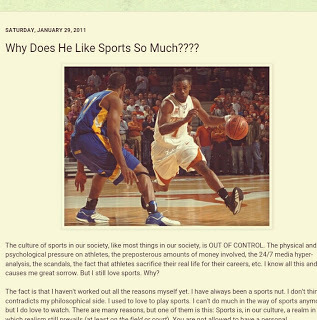 It's time to celebrate yet another unusual birthday: the NEVER GIVE UP Blog is seven years old.
It's time to celebrate yet another unusual birthday: the NEVER GIVE UP Blog is seven years old.Since the subject of this, the second blog post of that day (January 29, 2011), is still pertinent and timely now in 2018, I have decided to repost it.
This is a brief and very general reflection about the world of sports. I used to post much more frequently about sporting events on social media back in those days, to the point of driving some of my friends crazy. I suppose I wrote this as a sort of explanation. Or rationalization. Or something like that.
In any case, I think it still holds true today. Here it is:
The culture of sports in our society, like most things in our society, is OUT OF CONTROL: the physical and psychological pressure on athletes, the preposterous amounts of money involved, the 24/7 media hyper-analysis, the scandals, the fact that athletes sacrifice their real life for their careers, etc.
I know all this and it causes me great sorrow. But I still love sports. Why?
The fact is that I haven't worked out all the reasons myself yet.
I have always been a sports nut. I don't think it contradicts my philosophical side. I used to love to play sports. I can't do much in the way of sports anymore, but I do love to watch.
There are many reasons, but one of them is this: Sports is, in our culture, a realm in which realism still prevails (at least on the field or court).
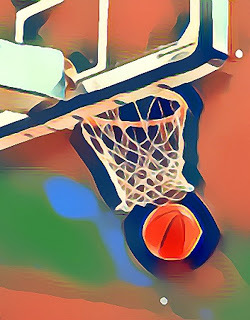 You are not allowed to have a personal interpretation of whether or not it was a basket. You can't say,
You are not allowed to have a personal interpretation of whether or not it was a basket. You can't say, "well, it was a basket for me even though it might not have been a basket for you." It either went through the hoop or it didn't. Period.
There are rules, boundaries, the need for effort, the need to pay attention to other people, the need to submit to objective facts that you can't bend with your own mind.
This is fundamentally good and healthy.
At least on the field, sports have preserved the context necessary for some kind of real human drama, even if it is only play. We do, after all, need "play" in our lives.
It is hard, however, to bracket out the monstrous business of the sports industry, and how it devours people. Although it should also be said that many good people work in the sports profession, and sports on various levels make many positive contributions to our community.
Like everything else in our world, in sports we find the good, the bad, and the ugly. And there are many things in our culture that are much worse.
As I said, the bottom line on the playing field is that you have to deal with reality. By contrast, in my own profession, academia, you can say anything you want about anything you want and call it "interpretation" (as long as you know how to manipulate the system, push the right buttons, ride the prevailing trends).
In sports, you've got to sink that jump shot. The real ball has to go through a real hoop.
When the game starts, there is no huckstering, politics, or distortion. There is a field or a court and you've got to use it. You've got to play by the rules.
That's what I find refreshing and hopeful about sports.
Published on January 29, 2018 19:30




